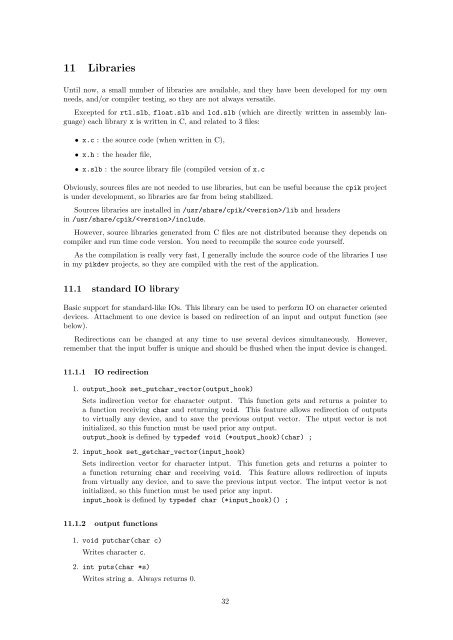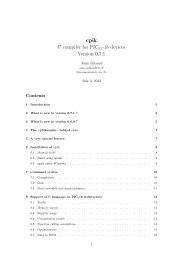cpik C compiler for PIC c -18 devices Version 0.6.0 - PiKdev, An IDE ...
cpik C compiler for PIC c -18 devices Version 0.6.0 - PiKdev, An IDE ...
cpik C compiler for PIC c -18 devices Version 0.6.0 - PiKdev, An IDE ...
Create successful ePaper yourself
Turn your PDF publications into a flip-book with our unique Google optimized e-Paper software.
11 Libraries<br />
Until now, a small number of libraries are available, and they have been developed <strong>for</strong> my own<br />
needs, and/or <strong>compiler</strong> testing, so they are not always versatile.<br />
Excepted <strong>for</strong> rtl.slb, float.slb and lcd.slb (which are directly written in assembly language)<br />
each library x is written in C, and related to 3 files:<br />
• x.c : the source code (when written in C),<br />
• x.h : the header file,<br />
• x.slb : the source library file (compiled version of x.c<br />
Obviously, sources files are not needed to use libraries, but can be useful because the <strong>cpik</strong> project<br />
is under development, so libraries are far from being stabilized.<br />
Sources libraries are installed in /usr/share/<strong>cpik</strong>//lib and headers<br />
in /usr/share/<strong>cpik</strong>//include.<br />
However, source libraries generated from C files are not distributed because they depends on<br />
<strong>compiler</strong> and run time code version. You need to recompile the source code yourself.<br />
As the compilation is really very fast, I generally include the source code of the libraries I use<br />
in my pikdev projects, so they are compiled with the rest of the application.<br />
11.1 standard IO library<br />
Basic support <strong>for</strong> standard-like IOs. This library can be used to per<strong>for</strong>m IO on character oriented<br />
<strong>devices</strong>. Attachment to one device is based on redirection of an input and output function (see<br />
below).<br />
Redirections can be changed at any time to use several <strong>devices</strong> simultaneously. However,<br />
remember that the input buffer is unique and should be flushed when the input device is changed.<br />
11.1.1 IO redirection<br />
1. output_hook set_putchar_vector(output_hook)<br />
Sets indirection vector <strong>for</strong> character output. This function gets and returns a pointer to<br />
a function receiving char and returning void. This feature allows redirection of outputs<br />
to virtually any device, and to save the previous output vector. The utput vector is not<br />
initialized, so this function must be used prior any output.<br />
output_hook is defined by typedef void (*output_hook)(char) ;<br />
2. input_hook set_getchar_vector(input_hook)<br />
Sets indirection vector <strong>for</strong> character intput. This function gets and returns a pointer to<br />
a function returning char and receiving void. This feature allows redirection of inputs<br />
from virtually any device, and to save the previous intput vector. The intput vector is not<br />
initialized, so this function must be used prior any input.<br />
input_hook is defined by typedef char (*input_hook)() ;<br />
11.1.2 output functions<br />
1. void putchar(char c)<br />
Writes character c.<br />
2. int puts(char *s)<br />
Writes string s. Always returns 0.<br />
32



